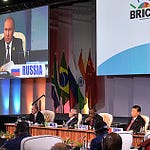A quick announcement: We’re holding a free live Sovereign Finance discussion on Sunday 20th July, at 7.30PM on Zoom. We’ll discuss global trends, things you might do, and answer questions from the podcast so far. Register for free here.
Rob’s comments below are in italics.
Derek’s comments below are in normal font.
Okay, so it’s the 10th of July. It's a full moon rising today or tomorrow. We'll review some of the contemporary events insofar as they're likely to have an impact on your finances.
How much importance do you put on the changing of the moon by the way? I know some people who organise their lives around it, and many others who just think it's woo woo. I wondered where you stood on these things. It's quite hard to know, is my stance.
Yeah, absolutely. As I've said before, I'm agnostic about most things in principle. Even things I'm 99% certain of, I'm open to seeing evidence which causes me to revise my view. However, if it's under 99%, I'd be very surprised if such evidence appeared. The impact of the moon, I don't know.
My subjective impression is that quite often, around a full moon, the psychic tension peaks. There could be all types of really mundane, prosaic explanations for that. The mere fact that it's a lot brighter at night and very few people have completely blacked out bedrooms that makes it that bit more difficult to sleep. That could be a factor.
It could just be a placebo effect as well, where if you think it makes a difference, then it probably does.
Yeah, it could be that, too. Although the placebo effect is often overrated when it's used as a dismissal that there's anything real going on.
This touches on a point which is often not nearly as widely realised as it ought to be, which is that looking for causes and effects is almost invariably an oversimplification because anything which is non-trivial. This certainly applies to all of finance, all of markets, all of governments, all of politics, all of public opinion, as well as, you know, more concrete things like population growth or reduction, food supplies, energy supplies, prices of things.
All of these are part of the dynamic system, which consists of multiple nested feedback loops. So consequently, to choose one factor in a situation, assume that it is the cause of something else and that there's a cause and effect. It may well be, but it's itself the cause of something else, which is the cause of something else. Before you've gone too many times around the chain, it's going to be the cause of the thing that you think is causing the effect. Does that make sense? Was that clear?
I once read someone describe homo sapiens should be called homo explanicusbecause we just go through trying to assign explanations for things that may be quite complicated. We then create a story, narrative, and worldview based on that, which may have some directional accuracy, but it's never completely accurate.
Yep, that is absolutely the case. That ties into George Soros's key insight on reflexivity, that markets go up because some people think that they're going to go up, which makes them go up, which makes more people think they're going to go up and so on. So you get that feedback loop.
Until it becomes clear that it's overshot any realistic possible outcome, at which point the same thing goes into reverse and usually much more rapidly. That is a general factor of any dynamic system. As we've discussed before, that's built into the model of the limits to growth. We clearly are in overshoot on a number of fronts.
This is one major perspective on trying to make sense of what's going on in the world at the moment. Another major perspective on it is that the American Empire is clearly in its latter phase. One of the things that always happens in the latter phase of empires is that the people responsible for operating the empire are in acute denial of this.
Somebody was pointing out the other day that America hasn't fought a war against any opponent which is remotely comparable in strength and organisation since 1945. It's been at war continuously somewhere or other in between, invariably in a very unequal context.
That leaves amongst the warmongers in the American establishment, which is still in the ascendant...
I saw that Trump had been nominated by Netanyahu for the Nobel Peace Prize!
You couldn't make it up, could you? That was one of the more ridiculous events of recent days.
Caitlin Johnson's newsletter today raised a very interesting perspective on it. It says the Empire is a non-stop insult to our intelligence. Marco Rubio just denounced Francesca Albanese, the UN rapporteur on the Israeli Holocaust in Gaza. Of course, the UK government has listed Palestine Action as a terrorist group.
Meanwhile, HDS, which is the Al-Qaeda proxy running the Syrian government, has now just been delisted as a terrorist group. So, you put all those things together, it's certainly reaching the point that we keep thinking we've reached where satire is no longer possible, because nothing is more absurd than what's going on in the real world.
Yeah, I definitely, given that I have some ambitions to write novels, I don't think I can make this shit up.
No. Incidentally, talking of novels, I just read an Ian Banks one. It must have been one of his last, I should think. It's called Transition. Have you been a follower of Ian Banks at all?
No, I'm not familiar.
It was very interesting. I couldn't help feeling it was an allegory for the Deep State. I won't go into that; we'll get too far off track. That's the first novel I've read in a long long time. I've mostly been reading non-fiction of one sort or another, as anything is non-fiction.
BRICS Summit
So, in the past week, they completed the BRICS summit. By all of the accounts that I find credible, it was a considerable success. In the Western press, there have been the usual attempts to marginalise it and discredit it. This is obviously going to be a very significant development in terms of world trade. It's primarily world trade.
Certainly, what's called the global south, the ex-colonial countries seem to be putting a great deal of faith in this as an avenue to the real prosperity that they thought when they attained their nominal independence from the colonial empires...
If not financial independence, saddled by loans and all sorts of things.
Exactly. The really brilliant speech by Lavrov, about a 30-minute speech followed by 15 minutes of questions and answers. That's available in full on the YouTube channel from the Hindustan Times. It's a very sound investment of 45 minutes or less, depending on the speed you tend to listen to these things.
What he says appears to me, A, to make sense and B, to be absolutely sincerely meant. I listen to what everybody says, whether they're people that I'm sympathetic to or not. I think it's more important that we listen to people we disagree with. First of all, hear what's going on outside our own particular chosen chamber. Secondly, because it's conceivable that even if somebody that I'm completely unsympathetic to might have something to say, which shifts my opinion or my perspective to some degree. But also it's deeply fascinating.
There are two things that I'm on the lookout for when I listen to what anybody has to say, particularly anybody in a position of political power or influence or financial power or influence. The first thing I'm looking for is, do I get the impression that this person sincerely believes what he's saying, or is he deliberately fabricating it to serve some other agenda? Definitely with Lavrov, I haven't seen a single thing which suggests to me that he's making stuff up.
The second thing that I'm on the lookout for is, assuming they are sincere, do I believe that they are significantly mistaken in the position that they've embraced? If I believe that they're sincere and basing their assertions and opinions on, as best I can judge, an accurate reading of events, I think they're well worth listening to and well worth taking on board.
One of the things that he said and that Putin has said as well over and over again is that the world could work a lot better by adhering to the charter of the United Nations, which we've all nominally signed up for. Clearly, the Americans cynically disregard at every turn. People have to look at the record and make up their own minds whether they think the Russians and the Chinese disregard that or whether they more broadly adhere to it.
You can understand why the BRICS Nations have backed the other horse.
Yeah, absolutely you can. They certainly haven't got anywhere by backing the other one. The events of the past month, even more than the past year or two, have ever seriously undermined the credibility of the West.
Seriously undermined people's ability to accept any public pronouncements from any of the Western nations without taking it with a pinch of salt. Which moves on to probably a very major factor, which we should all be investigating under our own best attempts at due diligence, which is the shift away from the dollar as a global reserve currency.
I wanted to say one other thing about the treatment in the Western press of the British nations. There was quite a lot made of the fact that neither Putin nor Xi Jinping attended it in person, which they are trying to put some spin on as reducing the credibility of the organisation or reducing the commitment of those individuals to it. You know, calling it, calling into question whether they are in some way having their power diminished or something.
It's perfectly understandable that heads of state no longer feel that it's necessary and that they can send other ministers. One of the notable developments at this BRICS summit was the increase in breakout groups. Meetings were held among experts from various countries to discuss matters. To make practical arrangements about various aspects of how they should work together more closely.
One of these is that an increasing amount of trade is being done by the various members and the associates of BRICS directly between one another in their own currencies. There was speculation a couple of years back that they were going to come up with their own currency. That was obviously entirely premature.
I believe that in the future, before the end of the century, there will be a single global currency used for all transactions, because of the ratio between international trade and internal trade that almost every country has. It makes no sense to have separate currencies per nation.
It doesn't serve working people to have all these crazy fluctuations and to have the gambling on it essentially, which is all it is.
Well apart from the fact that some people are doing very nicely by gambling on it, of course, cancelled out by the losses that other people make because it's a zero-sum game. The only real reason for the continuing attachment is that the governments of every country want to be able to manipulate their currency for their own purposes.
So it doesn't solve anything. I think we will make a full circle to having that currency defined by reference to gold, because that is ultimately the only reason, the only mechanism that has ever been implemented which really works to prevent abuse through devaluation of the currency.
Yeah, every fiat currency has crashed and burned, hasn't it?
Yeah, or even the supposedly non-Fiat currencies. The Roman Empire supposedly had a silver-based currency, but as time went on, they debased the metal in the coinage more and more. As they say, history doesn't repeat itself, but it rhymes.
Each time around, we've got a slightly different arrangement. So once again, we all need to take a look at that, see what our assets are denominated in, what is substantial, what is based on something and what is built on sand.
Do you think we're gonna get this big financial crash that has been promised for a while, possibly to then usher in digital ID and control matrix on top of that?
Whether or not it's clear that they would like to usher in a digital ID, it's also clear to me from my own experience…
It's being introduced anyway. There will be slow incentives coming in. Then they'll try to enforce it or make it mandatory. A proportion of the population will say no, which will likely undermine the whole thing. Hopefully, we'll end up with a system that actually works for everyone. But it's gonna be rocky.
Yeah, it's going to be rocky. That is one of my current themes. The outcomes are not set in stone. If they were, we'd be living in a much less interesting world. We all knew what was definitely going to be the future. So, it's just a question of watching it day by day.
The Ukraine war is clearly now set in for the long haul, barring some unexpected event. It seems as though both sides are absolutely locked into incompatible positions. Russia has said yet again that it would prefer a diplomatic solution. It's ready to talk anytime. If there isn't a diplomatic solution, it will be determined on the battlefield.
It doesn't serve the interests of the US empire to have a diplomatic solution, which means that a lot of people are going to be pointlessly fed into the meat grinder.
I'm amazed that they still have enough morale to continue the fight, but there you go. Of course, every day that the war goes on, not only are lives lost tragically on all sides, far more on the Ukrainian side than on the Russian one, but whoever they are, they're human beings. They've got wives, sons, daughters, mothers, partners.
But not only that, every day of warfare is a destruction of wealth. It's far easier to destroy things than to build them.
I've seen that with my kids. It's far easier to pull the house apart than it is to tidy everything up!
Yep, absolutely entropy. Anyway, a collection of observations today, but hopefully there’s something of interest to people in today’s discussion.
P.S. Don’t forget you can register here for Sunday’s live discussion.














Share this post